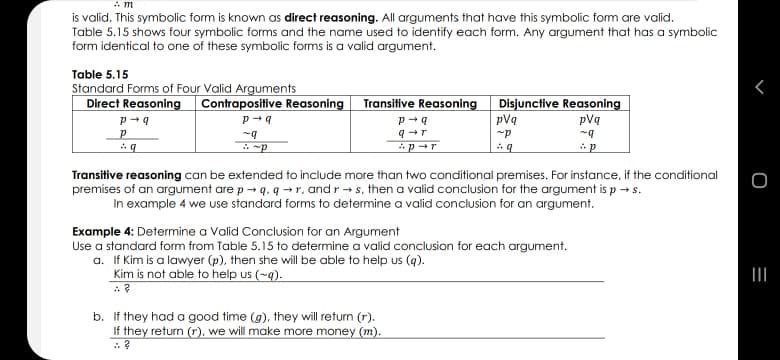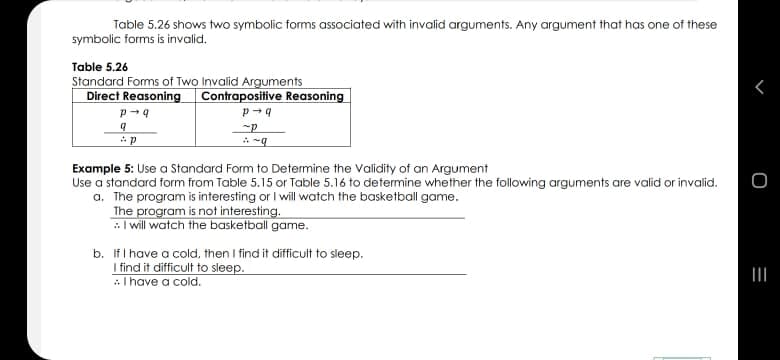Use a standard form from Table 5.15or Table 5.16 to determine whether the following arguments are valid or invalid. a. If I go to Florida for spring break, then I will not study. I did not go to Florida for spring break. ∴ I studied. b. If you helped solve the crime, then you should be rewarded. You helped solve the crime. ∴ You should be rewarded.
Use a standard form from Table 5.15or Table 5.16 to determine whether the following arguments are valid or invalid. a. If I go to Florida for spring break, then I will not study. I did not go to Florida for spring break. ∴ I studied. b. If you helped solve the crime, then you should be rewarded. You helped solve the crime. ∴ You should be rewarded.
Advanced Engineering Mathematics
10th Edition
ISBN:9780470458365
Author:Erwin Kreyszig
Publisher:Erwin Kreyszig
Chapter2: Second-order Linear Odes
Section: Chapter Questions
Problem 1RQ
Related questions
Question
Use a standard form from Table 5.15or Table 5.16 to determine whether the following arguments are valid or invalid.
a. If I go to Florida for spring break, then I will not study.
I did not go to Florida for spring break.
∴ I studied.
b. If you helped solve the crime, then you should be rewarded.
You helped solve the crime.
∴ You should be rewarded.

Transcribed Image Text:is valid. This symbolic form is known as direct reasoning. All arguments that have this symbolic fom are valid.
Table 5.15 shows four symbolic forms and the name used to identify each form. Any argument that has a symbolic
form identical to one of these symbolic forms is a valid argument.
Table 5.15
Standard Forms of Four Valid Arguments
Direct Reasoning
Contrapositive Reasoning Transitive Reasoning
Disjunctive Reasoning
pVq
pVq
Transitive reasoning can be extended to include more than two conditional premises. For instance, if the conditional
premises of an argument are p - q. q r, and r- s, then a valid conclusion for the argument is p → s.
In example 4 we use standard forms to determine a valid conclusion for an argument.
Example 4: Determine a Valid Conclusion for an Argument
Use a standard form from Table 5.15 to determine a valid conclusion for each argument.
a. If Kim is a lawyer (p), then she will be able to help us (q).
Kim is not able to help us (~q).
II
b. If they had a good time (g), they will return (r).
If they return (r), we will make more money (m).

Transcribed Image Text:Table 5.26 shows two symbolic forms associated with invalid arguments. Any argument that has one of these
symbolic forms is invalid.
Table 5.26
Standard Forms of Two Invalid Arguments
Direct Reasoning Contrapositive Reasoning
Example 5: Use a Standard Form to Determine the Validity of an Argument
Use a standard form from Table 5.15 or Table 5.16 to determine whether the following arguments are valid or invalid.
a. The program is interesting or I will watch the basketball game.
The program is not interesting.
:I will watch the basketball game.
b. IfI have a cold, then I find it difficult to sleep.
I find it difficult to sleep.
AI have a cold.
II
Expert Solution
This question has been solved!
Explore an expertly crafted, step-by-step solution for a thorough understanding of key concepts.
This is a popular solution!
Trending now
This is a popular solution!
Step by step
Solved in 3 steps

Recommended textbooks for you

Advanced Engineering Mathematics
Advanced Math
ISBN:
9780470458365
Author:
Erwin Kreyszig
Publisher:
Wiley, John & Sons, Incorporated

Numerical Methods for Engineers
Advanced Math
ISBN:
9780073397924
Author:
Steven C. Chapra Dr., Raymond P. Canale
Publisher:
McGraw-Hill Education

Introductory Mathematics for Engineering Applicat…
Advanced Math
ISBN:
9781118141809
Author:
Nathan Klingbeil
Publisher:
WILEY

Advanced Engineering Mathematics
Advanced Math
ISBN:
9780470458365
Author:
Erwin Kreyszig
Publisher:
Wiley, John & Sons, Incorporated

Numerical Methods for Engineers
Advanced Math
ISBN:
9780073397924
Author:
Steven C. Chapra Dr., Raymond P. Canale
Publisher:
McGraw-Hill Education

Introductory Mathematics for Engineering Applicat…
Advanced Math
ISBN:
9781118141809
Author:
Nathan Klingbeil
Publisher:
WILEY

Mathematics For Machine Technology
Advanced Math
ISBN:
9781337798310
Author:
Peterson, John.
Publisher:
Cengage Learning,

